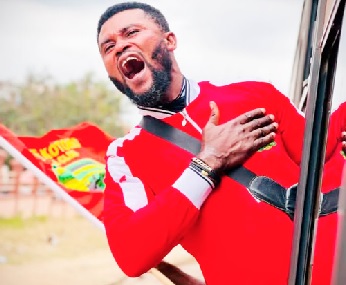The beautiful game in Ghana is in mourning. The tragic death of Asante Kotoko supporter Yaw Frimpong, affectionately known as ‘Pooley,’ has cast a long shadow over the nation’s football community.
The young man lost his life during violent clashes at Nana Koronamansah II Park during a Premier League clash between Asante Kotoko and Nsoatreman FC last Sunday.
That dastardly incident was a grim reminder of the escalating threat of hooliganism that now looms as the single biggest danger to Ghanaian football.
It has not only shaken the football fraternity but also galvanised it into action. Ghana’s two football powerhouses, Asante Kotoko and Hearts of Oak, have set aside their historic rivalry to lead an unprecedented call for reform.
The traditional giants, whose rivalry is the lifeblood of Ghanaian football, have taken the lead in advocating for sweeping reforms.
The two clubs have drafted a joint position paper demanding immediate and far-reaching changes to matchday security, insisting that Pooley’s death should serve as a defining moment, galvanising all stakeholders into decisive action.
In response to the crisis, the GFA postponed all 20th-week Premier League fixtures to allow for extensive consultations with club executives, fan groups and law enforcement agencies.
Watershed moment
Pooley’s death has become a rallying cry for change. Recognising the severity of the crisis, the Inspector General of Police (IGP), Dr George Akuffo Dampare convened an emergency meeting at the Police Headquarters in Accra last Wednesday, bringing together the Ghana Football Association (GFA), GFA Executive Council, the Ghana League Clubs Association (GHALCA), representatives from Premier League clubs, and other security forces to launch a sweeping security crackdown, armed with a 33-point action plan aimed at tackling the scourge of violence that threatens to tear the sport apart.
Among the key reforms are the appointment of Sports Security Officers in each of Ghana’s 16 regions, the creation of a specialised Sports Policing Unit, and the integration of sports security training into police recruitment programmes.
Undercover intelligence operatives will also be deployed within supporter groups to monitor potential threats, while a nationwide fan education campaign will aim to instil discipline and sportsmanship.
The police chief left no room for ambiguity, declaring: “We are committed to fixing this problem. We will get it done because it is our responsibility to protect the people of Ghana and the very fabric that unites us.”
Football at crossroads
Beyond the immediate tragedy, the growing scourge of hooliganism and security concerns, as well as timely medical response, at match venues are further damaging domestic football already plagued by dwindling match attendance, financial struggles and declining competitive standards.
The exodus of top players to foreign leagues, where they seek better wages and working conditions, has left domestic competitions devoid of star attractions.
This talent drain, coupled with crowd violence, makes it increasingly difficult to revive public interest in the league.
Financial woes have also deepened. StarTimes, the league’s Official Broadcast Sponsor, ended its partnership with the GFA this season, depriving clubs of crucial revenue.
Additionally, betPawa’s abrupt termination of its title sponsorship has left the Ghana Premier League competition in financial turmoil.
With the GFA now relying on its limited internal resources to support clubs, the economic constraints on teams are more severe than ever.
With limited resources, clubs are struggling to maintain operations and keep their best players, coupled with limited investment in infrastructure and technical development, further diminishing the quality of the elite league.
The declining standard of competition in the league has been painfully evident in Ghana’s performances in continental competitions.
FC Samartex 1996 and Nsoatreman FC, Ghana’s flag bearers in the CAF Champions League and CAF Confederation Cup, respectively, both failed to progress beyond the second preliminary round.
Their struggles highlight the declining competitiveness of Ghanaian clubs on the continental stage, a worrying sign of the league’s overall weakness.
For sponsors and other corporate investors, the frequent incidents of violence make the league an unattractive investment.
Businesses are hesitant to associate their brands with competitions marred by hooliganism, controversy and security risks, making it even harder to secure long-term financial partnerships.
Without major corporate investment, clubs will continue to struggle financially, leading to even more player departures and a further decline in the quality of the league.
Damage to sport’s image
Violent incidents in the Division One League and in recent times in the Women’s Premier League matches have further damaged the image of Ghanaian football.
The spread of violence into the women’s game comes at a time when Ghanaian women’s football is striving to gain more recognition and attract sponsors.
Its long-term consequences could be devastating as young girls, aspiring to become professional footballers, may be discouraged from pursuing the sport due to safety concerns.
The worsening matchday experience due to hooliganism and violence has driven fans away, with families and casual spectators opting for foreign leagues on TV where top-quality football and safety are guaranteed.
The absence of an engaging atmosphere at local matches not only affects revenue generation but also reduces the prestige and appeal of the Ghana Premier League and other domestic competitions.
Last Sunday’s tragedy has come at a time when Ghanaian football is already grappling with multiple challenges.
Without immediate reforms and action, the sport risks losing its integrity, supporters, corporate partners and other investments, and the opportunity to establish itself as a force in African and global football.

